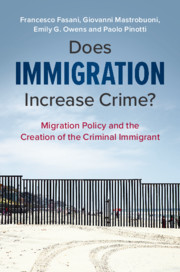Description
Does Immigration Increase Crime?
Migration Policy and the Creation of the Criminal Immigrant
Authors: Fasani Francesco, Mastrobuoni Giovanni, Owens Emily G., Pinotti Paolo
The supposed link between immigration and crime is a highly contentious issue. This innovative book examines the evidence.
Language: English
Subject for Does Immigration Increase Crime?:
Approximative price 31.58 €
In Print (Delivery period: 14 days).
Add to cart
Does Immigration Increase Crime?
Publication date: 09-2019
218 p. · 15.2x22.8 cm · Paperback
Publication date: 09-2019
218 p. · 15.2x22.8 cm · Paperback
Approximative price 65.00 €
In Print (Delivery period: 14 days).
Add to cart
Does Immigration Increase Crime?
Publication date: 09-2019
218 p. · 15.7x23.5 cm · Hardback
Publication date: 09-2019
218 p. · 15.7x23.5 cm · Hardback
Description
/li>Contents
/li>Biography
/li>
Do migrants lead to an increase of crime rates in their host societies? This highly contentious issue has become a mainstay in the political debate and a lightning rod for the galvanization of populist movements, despite often lacking any empirical support. In this game-changing book, the authors examine what the existing data actually says, and provide their own novel evidence on the immigration-crime connection. Taking the unusual approach of analysing the subject from an economic perspective, the authors build on the pioneering work of Nobel Prize winner Gary Becker to construct their innovative arguments. By considering evidence from different countries, with a focus on establishing causal relationships, the authors are able to analyse not only if migrants do cause crime but also whether migration policies can play a role in shaping incentives for migrants to engage in crime. This book will appeal to students and academics across the social sciences, as well as citizens interested in this topical issue.
Introduction; 1. Immigration and crime: perceptions and reality; 2. Migration policy and crime in Italy; 3. Immigration and crime in the United Kingdom; 4. The case of the United States; 5. Refugee waves and crime: evidence from EU countries; Conclusion; Appendices; References.
Francesco Fasani is an Associate Professor at the School of Economics and Finance, Queen Mary University of London. He is a Research Affiliate at CEPR (Centre for Economic Policy Research) and a Research Fellow at CReAM (Centre for Research and Analysis of Migration) and IZA (Institute for the Study of Labor, Bonn).
Giovanni Mastrobuoni is Carlo Alberto Chair at the Collegio Carlo Alberto and Professor in Economics at the University of Turin, ESOMAS, and at the University of Essex. He is a research fellow at the Institute for the Study of Labor in Bonn and editor of The B.E. Journal of Economic Analysis and Policy.
Emily G. Owens is a Professor in the Department of Criminology, Law, and Society and the Department of Economics at the University of California, Irvine. She is an associate editor of the Journal of Quantitative Criminology, a senior research fellow at the Police Foundation, and a fellow of the Academy of Experimental Criminology.
Paolo Pinotti is Endowed Associate Professor in Economic Analysis of Crime at the Department of Social and Political Sciences at Università Commerciale Luigi Bocconi, Milan. His other roles include Coordinator of Fondazione Rodolfo Debenedetti, Director of the CLEAN Unit on the economics of crime at the Baffi-Carefin Center, Senior Researcher at FBK-IRVAPP, Researcher at Dondena, and Associate Editor of the Journal of the European Economic Association.
Giovanni Mastrobuoni is Carlo Alberto Chair at the Collegio Carlo Alberto and Professor in Economics at the University of Turin, ESOMAS, and at the University of Essex. He is a research fellow at the Institute for the Study of Labor in Bonn and editor of The B.E. Journal of Economic Analysis and Policy.
Emily G. Owens is a Professor in the Department of Criminology, Law, and Society and the Department of Economics at the University of California, Irvine. She is an associate editor of the Journal of Quantitative Criminology, a senior research fellow at the Police Foundation, and a fellow of the Academy of Experimental Criminology.
Paolo Pinotti is Endowed Associate Professor in Economic Analysis of Crime at the Department of Social and Political Sciences at Università Commerciale Luigi Bocconi, Milan. His other roles include Coordinator of Fondazione Rodolfo Debenedetti, Director of the CLEAN Unit on the economics of crime at the Baffi-Carefin Center, Senior Researcher at FBK-IRVAPP, Researcher at Dondena, and Associate Editor of the Journal of the European Economic Association.
© 2024 LAVOISIER S.A.S.

